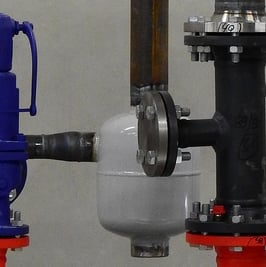
Are you frustrated with your water heater frequently experiencing leaks? Have you found yourself in a constant cycle of replacing water heaters without understanding the root cause of the issues? If this sounds familiar, it’s time to consider the installation of a water heater expansion tank.
What is a Water Heater Expansion Tank?
A water heater expansion tank does not increase your water heater's hot water storage capacity. Instead, it is a pressure buffer that helps regulate water pressure within your plumbing system. This simple addition can significantly extend the lifespan of your water heater and protect your entire plumbing system.
Understanding How a Water Heater Expansion Tank Works
A water heater expansion tank is a purposeful addition to your plumbing system. It's a container attached to the cold water pipe going to your water heater, inside a strong metal case. Inside, it houses a cleverly designed rubber diaphragm and a carefully pressurized air pocket.
Here's a step-by-step breakdown of how this ingenious device operates:
- Pressure Relief: As your water heater heats the water stored within, it undergoes a natural expansion. This thermal expansion causes a surge in pressure within the plumbing system. The excess pressurized water flows back into the expansion tank to counter this. The rubber diaphragm in the tank allows water to enter and diffuse the mounting pressure.
- Return to Balance: The pressurized air pocket within the tank doesn't sit idly by. It springs into action when the hot water cools down. When the water gets colder, the air pressure in the tank pushes the stored water back into the pipes, restoring balance.
Essentially, the expansion tank protects your plumbing system by absorbing pressure changes, preventing damage to your pipes and water heater.
Consequences of Skipping Expansion Tank Installation
- Increased Pressure: Without an expansion tank, the water inside your water heater tank will expand as it heats up. This expansion increases the pressure within the tank and the plumbing system.
- Stress on Plumbing Components: The increased pressure can put significant stress on your plumbing pipes, fittings, and fixtures. This added stress can lead to premature wear and tear, potentially causing leaks, cracks, or even pipe bursts.
- Water heater damage: Temperature changes can harm the tank by causing it to expand and contract repeatedly. Over time, this can result in the tank's distortion, its structure weakening, and the degradation of rubber seals or gaskets.
- Reduced Efficiency: As your water heater experiences increased pressure and potential damage, its efficiency can decrease. This means it will have to work harder to heat water, resulting in higher energy bills.
- Shortened Lifespan: The cumulative effect of increased pressure and potential damage can significantly shorten the lifespan of your water heater. You may find yourself needing to replace your water heater sooner than expected.
- Leaks: No expansion tank can cause leaks in your plumbing, which may damage your home with water. These leaks can occur at various points, including at pipe joints, valves, or even within the water heater itself.
- Inconsistent Hot Water Supply: The fluctuations in pressure caused by thermal expansion can result in inconsistent hot water supply. You may experience fluctuations in water temperature while using hot water fixtures, which can be inconvenient.
Not having an expansion tank can lead to various issues. These include high pressure, harm to plumbing and water heater, lower efficiency, shortened appliance lifespan, and increased chance of leaks.
To maintain good condition for your water heater and plumbing, we advise installing a water heater expansion tank. This is especially important if you have a closed-loop plumbing system. The expansion tank helps prevent problems and ensures the durability and efficiency of your water heater.
Older Homes and Considerations
Homes constructed before the mid-2000s may not necessarily require a thermal expansion tank. This happened because homes didn't have to use backflow prevention devices, so water could flow in both directions and relieve pressure.
However, it's worth noting that backflow increases the risk of water pollution. Older homeowners should hire a plumber to assess their risk. They should also have a backflow prevention valve and an expansion tank installed if necessary.
Neglecting to address these issues can lead to costly plumbing repairs in the long run. Water pollution and pressure-related damage can require extensive repairs or even full plumbing system replacements. Investing in preventative measures now can save you substantial expenses in the future.
Do you think your plumbing needs an expansion tank or do you have other problems with your water heater? Whether you have a gas or electrical water heater, we are here to help you. Contact Ken's Plumbing Services at (864) 397-8473. Our knowledgeable service professionals are available seven days a week to assist you


.png)